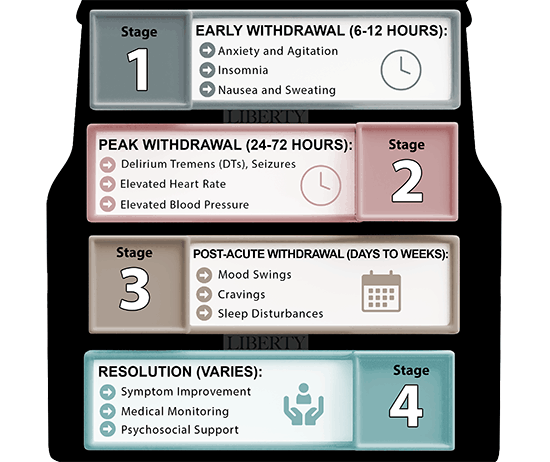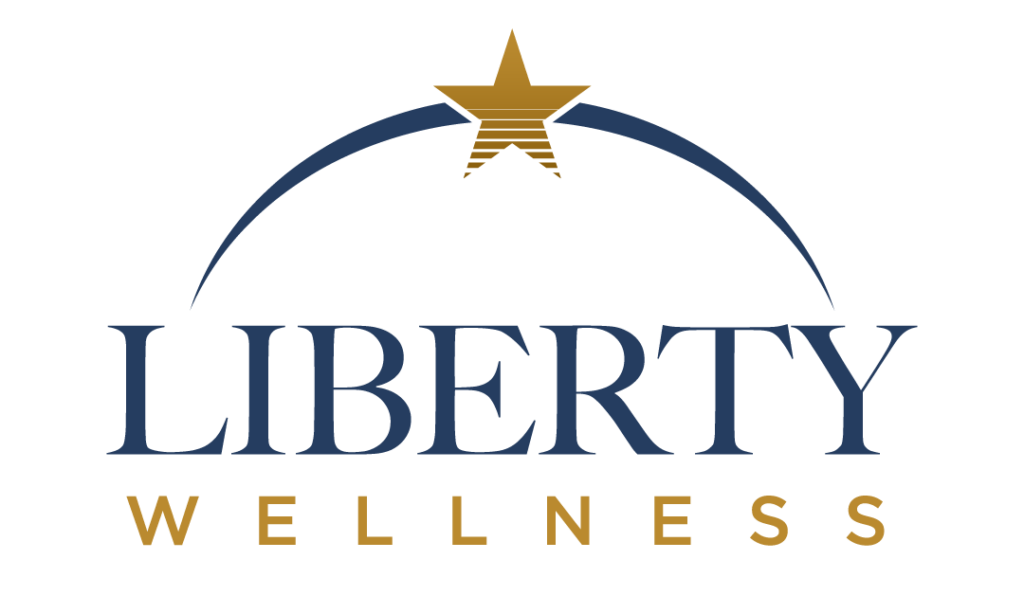Article Read Time: 17 minutes and 53 seconds
1. Introduction to Alcohol Withdrawal
Alcohol withdrawal is a complex and sometimes challenging process that individuals with alcohol dependence often face when deciding to stop drinking alcohol. At Liberty Wellness Drug and Alcohol Rehab center, we see the effects of both alcohol addiction and alcohol withdrawal on a daily basis. In this comprehensive guide, we will delve into the various aspects of alcohol withdrawal, including its symptoms, stages, and effective treatment options. Understanding this critical phase is crucial for individuals seeking recovery and the loved ones supporting them on this journey to sobriety.
2. What is Alcohol Withdrawal?
Alcohol withdrawal occurs when individuals who have been consuming alcohol on a regular basis suddenly stop or significantly reduce their alcohol intake. The body and mind, accustomed to the presence of alcohol, react to its absence or reduction, leading to a range of physical and psychological symptoms.
Understanding the mechanics of alcohol withdrawal involves recognizing the impact of alcohol on the central nervous system. Chronic alcohol use alters neurotransmitter levels in the brain, creating a state of dependence. When alcohol consumption ceases, the body struggles to adjust, resulting in withdrawal symptoms that can sometimes be severe and can even lead to alcohol withdrawal syndrome.
3. Causes of Alcohol Withdrawal
Alcohol withdrawal is primarily triggered by the cessation of alcohol intake, but understanding the underlying causes is essential. Prolonged and excessive alcohol consumption leads to changes in brain function, creating a reliance on alcohol for normal functioning. When alcohol is suddenly removed, the body reacts, manifesting withdrawal symptoms.
Exploring the causes involves examining the neurochemical imbalances induced by chronic alcohol use. The brain adapts to the presence of alcohol by adjusting neurotransmitter levels, and sudden withdrawal disrupts this delicate balance, causing physical and psychological distress.
4. Signs and Symptoms
4.1 Early Symptoms
The early symptoms of alcohol withdrawal often begin within hours of the last drink. These may include.
-
- Fever
-
- Rapid heartbeat
-
- Blood pressure issues
-
- Sleep disruption
-
- Sweating
-
- Shaking
4.2 Peak Symptoms
As withdrawal progresses, individuals may experience peak symptoms that reach their intensity within a specific timeframe, these may include
-
- Seizures
-
- Severe anxiety
-
- hallucinations
-
- panic attacks
-
- Increased blood pressure
-
- rapid breathing
-
- confusion
4.3 Post-Acute Withdrawal Symptoms (PAWS)
Post-Acute Withdrawal Symptoms (PAWS) can persist for weeks or months after initial withdrawal. These symptoms are more subtle but can still pose challenges to individuals in recovery. PAWS may include persistent mood swings, difficulty concentrating, and intermittent cravings for alcohol.
Understanding and anticipating PAWS is crucial for long-term recovery. Individuals may benefit from ongoing support, including therapy and participation in support groups. Recognizing these lingering symptoms as part of the recovery process helps individuals stay committed to their sobriety goals.
5. Stages of Alcohol Withdrawal

There are 4 stages of alcohol withdrawal, knowing the stages of alcohol withdrawal provides valuable insights into the progression of symptoms and the duration of the alcohol withdrawal process.
The stages of alcohol withdrawal generally follow a predictable timeline, but it’s important to note that the symptoms can range from mild to severe, and in some cases, withdrawal can be life-threatening. Here are the typical stages of alcohol withdrawal:
Early Withdrawal (6-12 hours):
Anxiety and Agitation: The first signs often include feelings of restlessness, anxiety, and irritability.
Insomnia: Difficulty sleeping is common during this stage.
Nausea and Sweating: Some individuals may experience nausea, sweating, and a general sense of discomfort.
-
- Peak Withdrawal (24-72 hours):
Delirium Tremens (DTs): In severe cases, individuals may develop DTs, characterized by hallucinations, confusion, and severe agitation. This is a medical emergency and requires immediate attention.
Elevated Heart Rate and Blood Pressure: Physiological symptoms such as increased heart rate and blood pressure can occur.
Seizures: Some individuals may experience seizures during this stage.
-
- Post-Acute Withdrawal (Days to Weeks):
Mood Swings: Emotional and psychological symptoms may persist, including mood swings, depression, and anxiety.
Cravings: The desire to consume alcohol may continue, and cravings can be intense.
Sleep Disturbances: Disruptions in sleep patterns may persist, with individuals experiencing difficulty falling or staying asleep.
Resolution (Varies):
-
- Symptom Improvement: In most cases, symptoms gradually improve over time.
-
- Medical Monitoring: For severe cases, medical monitoring may be necessary to address complications and provide supportive care.
-
- Psychosocial Support: Counseling, therapy, and support groups are often recommended to address the psychological aspects of alcohol dependence.
It’s crucial to emphasize that alcohol withdrawal can be unpredictable, and individuals experiencing severe symptoms should seek medical attention immediately. Medically supervised detoxification may be necessary to manage symptoms and prevent complications. This process is often conducted in an inpatient setting where healthcare professionals can closely monitor and provide appropriate interventions for the individual undergoing alcohol withdrawal.
6. Risk Factors
While not everyone who quits drinking will experience severe withdrawal, certain factors increase the risk.
Risk factors of alcohol withdrawal
-
- Severity of Alcohol Dependence:
The more heavily and regularly a person has been drinking, the higher the likelihood of experiencing withdrawal symptoms. Chronic alcohol dependence can lead to more severe withdrawal reactions.
-
- Duration of Alcohol Use:
Long-term alcohol use increases the risk of withdrawal symptoms. Individuals who have been drinking for an extended period of time are more likely to face withdrawal challenges.
-
- Amount of Alcohol Consumed:
Higher levels of alcohol consumption can contribute to more intense withdrawal symptoms. Individuals with a history of heavy or binge drinking are at a greater risk.
-
- Previous Withdrawal Episodes:
Individuals who have gone through alcohol withdrawal before may be more susceptible to subsequent episodes. Each withdrawal episode can potentially worsen symptoms.
-
- Age and Gender:
Older individuals may face increased risks during withdrawal. Gender differences also exist, with some studies suggesting that women may experience more severe withdrawal symptoms compared to men.
-
- Medical and Mental Health Conditions:
Existing medical conditions, especially liver or cardiovascular problems, can exacerbate withdrawal symptoms. Co-occurring mental health disorders may also complicate the withdrawal process.
-
- Genetic Factors:
Genetics can play a role in an individual’s susceptibility to alcohol dependence and withdrawal symptoms. Family history of alcohol use disorders may increase the risk.
-
- Abrupt Cessation vs. Gradual Reduction:
Abruptly stopping alcohol consumption can trigger more intense withdrawal symptoms. Gradual reduction or medically supervised detoxification may help mitigate the severity of withdrawal.
-
- Nutritional Status:
Poor nutrition, common in heavy drinkers, can contribute to complications during withdrawal. Thiamine deficiency, in particular, is a concern and can lead to Wernicke-Korsakoff syndrome.
-
- Social Support:
Lack of a supportive environment and social isolation can impact an individual’s ability to cope with withdrawal symptoms. Having a strong support system is critical during the recovery process.
It’s important for individuals contemplating alcohol cessation to seek guidance from healthcare professionals. Medically supervised detoxification can help manage withdrawal symptoms and reduce the risk of complications. If you or someone you know is struggling with alcohol dependence, consult with a healthcare provider or addiction specialist for personalized advice and treatment options.
7. Complications of Alcohol Withdrawal
7.1 Delirium Tremens (DTs)
Delirium Tremens is a severe and potentially life-threatening complication of alcohol withdrawal. It typically occurs within 48 to 72 hours after the last drink and is characterized by severe confusion, hallucinations, and autonomic nervous system hyperactivity.
The risk of DTs is higher in individuals with a history of heavy drinking, older adults, and those with co-existing medical conditions. Medical supervision, including the administration of benzodiazepines, is crucial to manage symptoms and prevent complications.
7.2 Seizures
Seizures can occur during alcohol withdrawal, typically within the first 24 to 48 hours. While not everyone experiences seizures, individuals with a history of withdrawal-related seizures or epilepsy are at a higher risk.
Medical professionals may prescribe anticonvulsant medications to reduce the risk of seizures during withdrawal. Close monitoring and timely intervention are essential in managing this complication.
7.3 Hallucinations
Alcohol withdrawal hallucinations can range from mild to severe, impacting an individual’s perception of reality. Visual or auditory hallucinations may occur during the acute withdrawal phase and can be distressing for the individual.
Medical professionals may use medications, such as antipsychotics, to manage severe hallucinations. Creating a calm and supportive environment is crucial to help individuals cope with this aspect of withdrawal.
Knowing the potential complications emphasizes the importance of seeking professional help during alcohol withdrawal. Medical supervision ensures early detection and intervention, minimizing the risk of severe outcomes.
8. Diagnosis and Assessment
Accurate diagnosis and assessment are important in determining the severity of alcohol withdrawal and guiding appropriate treatment. Healthcare professionals employ a combination of clinical interviews, physical examinations, and laboratory tests to evaluate an individual’s condition.
8.1 Clinical Interviews
Thorough clinical interviews help healthcare providers gather information about an individual’s drinking history, previous withdrawal experiences, and current symptoms. Open communication between the individual and the healthcare team is essential for an accurate assessment.
8.2 Physical Examinations
Physical examinations focus on identifying physical symptoms associated with alcohol withdrawal, such as elevated heart rate, tremors, and changes in blood pressure. These examinations provide valuable insights into the overall health of the individual.
8.3 Laboratory Tests
Laboratory tests, including blood tests and imaging studies, help assess organ function and detect any underlying medical conditions that may complicate withdrawal. Liver function tests are particularly important, as chronic alcohol use can impact liver health.
A comprehensive assessment allows healthcare professionals to tailor treatment plans to the individual’s specific needs, ensuring a more effective and personalized approach to alcohol withdrawal.
9. Treatment Options
Effective treatment for alcohol withdrawal involves a multi-faceted approach addressing both the physical and psychological aspects of dependence.
9.1 Medical Detoxification
Medical detoxification, often conducted in a supervised setting, helps individuals safely manage withdrawal symptoms.
Medical Detoxification Process:
-
- Assessment and Evaluation:
Before starting the detox process, healthcare professionals conduct a thorough assessment of the individual’s physical and mental health.
They evaluate the severity of alcohol dependence, medical history, and any co-occurring conditions.
-
- Stabilization:
The first step involves stabilizing the individual by managing immediate withdrawal symptoms. This may include medications to alleviate anxiety, insomnia, and seizures.
Monitoring vital signs is crucial to ensure the patient’s safety during this phase.
-
- Medication-Assisted Treatment (MAT):
MAT involves the use of medications to help manage cravings and withdrawal symptoms. Common medications include benzodiazepines, antipsychotics, and anti-seizure medications.
The choice of medication depends on the individual’s specific needs and the severity of their withdrawal symptoms.
-
- Nutritional Support:
Alcohol withdrawal can lead to nutritional deficiencies. Medical detox programs often include nutritional support to address these deficiencies and promote overall well-being.
-
- Psychological Support:
Counseling and therapy are integral parts of medical detox. Mental health professionals provide emotional support, address underlying issues contributing to alcohol dependence, and help individuals develop coping strategies.
-
- 24/7 Monitoring:
Medical detoxification is typically conducted in an inpatient setting with around-the-clock medical supervision.
This ensures that any complications or severe withdrawal symptoms can be promptly addressed by healthcare professionals.
Benefits of Medical Detoxification for Alcohol Withdrawal:
-
- Safety:
Professional supervision significantly reduces the risk of severe complications during the withdrawal process, such as delirium tremens and seizures.
-
- Comfort:
Medications used in medical detox help manage withdrawal symptoms, making the process more comfortable for individuals.
-
- Increased Success Rates:
Studies have shown that individuals who undergo medical detox are more likely to complete the withdrawal process successfully and continue with further treatment.
-
- Holistic Approach:
Medical detox programs address not only the physical aspects of withdrawal but also the psychological and nutritional needs of the individual.
-
- Prevention of Relapse:
The structured environment and support provided in medical detox programs contribute to a lower risk of relapse during the critical early stages of recovery.
In conclusion, medical detoxification is a vital component of the alcohol withdrawal process. It prioritizes the safety and well-being of individuals undergoing withdrawal, setting the foundation for a more successful and sustainable recovery from alcohol dependence. Seeking professional help during this challenging period is a crucial step towards achieving long-term sobriety.
9.2 Medications

Certain medications can alleviate symptoms and reduce the risk of complications during alcohol withdrawal. However, it’s important to note that this information is for general knowledge purposes, and you should consult with a healthcare professional for personalized advice.
Medications to alleviate alcohol withdrawal symptoms may include;
-
- Benzodiazepines:
Diazepam, Chlordiazepoxide, Lorazepam: These drugs are often used to manage alcohol withdrawal symptoms, including anxiety, seizures, and insomnia. They act on the central nervous system to produce a calming effect.
-
- Antipsychotics:
Haloperidol: This medication may be prescribed to control agitation and hallucinations during alcohol withdrawal.
-
- Antidepressants:
Selective Serotonin Reuptake Inhibitors (SSRIs) or Serotonin-Norepinephrine Reuptake Inhibitors (SNRIs): These medications can help manage mood disturbances and depression associated with alcohol withdrawal.
-
- Anticonvulsants:
Carbamazepine, Valproate: These drugs may be used to prevent or treat seizures during alcohol withdrawal.
-
- Naltrexone:
Naltrexone is an opioid receptor antagonist that may be prescribed to reduce alcohol cravings after detoxification. It is not typically used during the acute withdrawal phase.
-
- Acamprosate:
Acamprosate is thought to help balance neurotransmitters in the brain affected by chronic alcohol use. It is often used to support abstinence after detoxification.
It’s crucial to emphasize that these medications should only be used under the supervision of a qualified healthcare professional. They will assess the severity of withdrawal symptoms and tailor the treatment plan to the individual’s needs. Abruptly stopping alcohol use can be dangerous, and medical assistance is essential to ensure a safe and comfortable withdrawal process. If you or someone you know is experiencing alcohol withdrawal, seek medical attention promptly.
9.3 Therapies
Various therapeutic approaches play a crucial role in supporting individuals during alcohol withdrawal and promoting long-term recovery. Two widely recognized methods in this context are Cognitive-Behavioral Therapy (CBT) and Motivational Enhancement Therapy (MET).
-
- Cognitive-Behavioral Therapy (CBT):
Principles: CBT is based on the premise that thoughts, feelings, and behaviors are interconnected. It aims to identify and modify negative thought patterns and behaviors associated with alcohol use.
Components: CBT involves various components, including psychoeducation, cognitive restructuring, and behavioral interventions.
Application: In the context of alcohol withdrawal and recovery, CBT helps individuals recognize triggers for alcohol use, develop coping strategies, and replace maladaptive thoughts with healthier alternatives.
Benefits: CBT has shown efficacy in reducing alcohol cravings, preventing relapse, and addressing co-occurring mental health issues such as anxiety and depression.
-
- Motivational Enhancement Therapy (MET):
Principles: MET is rooted in the principles of motivational psychology. It seeks to enhance an individual’s intrinsic motivation to change by exploring and resolving ambivalence.
Components: MET involves empathetic listening, reflective feedback, and collaborative goal-setting. It encourages individuals to articulate reasons for change and explore discrepancies between their current behavior and future goals.
Application: In the context of alcohol withdrawal, MET is particularly useful during the early stages when individuals may be uncertain about making changes. It helps them build motivation, set achievable goals, and increase commitment to the recovery process.
Benefits: MET has demonstrated effectiveness in improving treatment engagement, reducing resistance to change, and fostering a positive attitude toward recovery.
-
- Integrated Approaches:
Combining Therapies: Many treatment programs utilize an integrated approach that combines various therapeutic modalities. For instance, integrating CBT and MET can provide a comprehensive treatment plan addressing both cognitive restructuring and motivational aspects.
Individualized Treatment: Recognizing the uniqueness of each individual’s needs, an integrated approach allows for tailoring therapy to specific challenges and preferences.
-
- Group Therapy and Support:
Peer Support: Group therapy, such as Alcoholics Anonymous (AA), provides a supportive environment where individuals can share experiences, receive encouragement, and learn from others who have successfully navigated alcohol withdrawal and recovery.
Family Therapy: Involving family members in therapy can strengthen the support system and address familial dynamics that may contribute to alcohol use.
In conclusion, therapeutic approaches like CBT and MET, whether used individually or in combination, are valuable tools in supporting individuals through alcohol withdrawal and fostering long-term recovery. These evidence-based methods address both cognitive and motivational aspects, empowering individuals to make positive changes and sustain recovery efforts.
9.4 Support Groups

Alcohol addiction support groups play a crucial role in aiding individuals on their journey to recovery. These groups offer a supportive community where individuals facing alcohol addiction can share their experiences, receive encouragement, and access valuable resources. Here are some key benefits of alcohol addiction support groups:
-
- Emotional Support:
Support groups provide a safe space for individuals to express their emotions and share their struggles without fear of judgment. Members often form deep connections and bonds, creating a sense of belonging.
-
- Shared Experiences:
Members of support groups have similar experiences with alcohol addiction. This shared understanding fosters empathy and camaraderie, allowing individuals to learn from each other and feel less isolated in their struggles.
-
- Accountability:
Support groups promote accountability by encouraging members to set and achieve personal goals. Knowing that others are facing similar challenges can motivate individuals to stay committed to their recovery.
-
- Education and Information:
Many support groups offer educational resources and information about alcohol addiction, treatment options, and coping strategies. This helps members make informed decisions about their recovery journey.
-
- Non-Judgmental Environment:
Support groups emphasize a non-judgmental atmosphere where individuals can openly discuss their experiences without fear of criticism. This acceptance is crucial for building trust and facilitating open communication.
-
- Structured Programs:
Some support groups follow structured programs that include step-by-step processes, providing a framework for recovery. This can be especially beneficial for individuals who thrive in a more organized and systematic approach.
-
- Peer Mentoring:
Within support groups, individuals at different stages of recovery often mentor each other. This mentorship provides practical insights, guidance, and hope, showing that sustained recovery is achievable.
10. Home Remedies and Self-Help
In addition to professional treatment, individuals can incorporate home remedies and self-help strategies to ease the challenges of alcohol withdrawal. Managing alcohol withdrawal and supporting recovery involves adopting a holistic approach that includes nutrition, hydration, relaxation techniques, and various self-help measures. Here are practical tips in each of these areas:
Nutrition:
-
- Balanced Diet:
Consume a well-balanced diet rich in fruits, vegetables, whole grains, and lean proteins. A nutritious diet supports overall health and aids in the recovery process.
-
- Vitamins and Minerals:
Ensure an adequate intake of vitamins and minerals, especially B-complex vitamins, vitamin C, and magnesium. These nutrients play a role in reducing the negative effects of alcohol withdrawal.
-
- Hydration:
Drink plenty of water to stay hydrated. Alcohol withdrawal can lead to dehydration, and maintaining proper fluid balance is essential for overall well-being.
-
- Avoid Stimulants:
Limit or avoid stimulants like caffeine and nicotine, as they can exacerbate anxiety and disrupt sleep. Opt for herbal teas or decaffeinated beverages.
Hydration:
-
- Water Intake:
Aim to drink at least eight 8-ounce glasses of water per day. Staying hydrated supports detoxification and helps alleviate some withdrawal symptoms.
-
- Electrolyte Balance:
Consume beverages with electrolytes to replenish minerals lost during alcohol use and withdrawal. This can be achieved through sports drinks or electrolyte-rich foods.
-
- Herbal Teas:
Herbal teas such as chamomile or peppermint can provide a soothing effect and contribute to hydration without the stimulant effects of caffeine.
Relaxation Techniques:
-
- Deep Breathing Exercises:
Practice deep breathing to reduce anxiety and stress. Inhale slowly through the nose, hold for a few seconds, and exhale through the mouth. Repeat regularly.
-
- Meditation and Mindfulness:
Engage in meditation or mindfulness practices to promote relaxation. Apps and online resources can guide you through guided meditation sessions.
-
- Yoga or Gentle Exercise:
Incorporate gentle exercise, such as yoga, into your routine. Physical activity can help alleviate stress, improve mood, and promote overall well-being.
Self-Help Measures:
-
- Establish a Routine:
Create a daily routine that includes regular mealtimes, hydration, and relaxation activities. A structured routine can provide stability during recovery.
-
- Social Support:
Connect with supportive friends, family, or support groups. Having a strong social support system can significantly impact the success of recovery.
-
- Set Realistic Goals:
Set achievable and realistic goals for yourself. Celebrate small victories, and recognize that recovery is a gradual process.
-
- Professional Support:
Consider seeking professional help from therapists, counselors, or support groups specialized in alcohol addiction. Professional guidance is invaluable during the recovery journey.
Always consult with healthcare professionals before making significant changes to your diet, exercise, or lifestyle, especially during alcohol withdrawal. These tips are general guidelines and may not replace individualized advice from healthcare providers.
11. Prevention
Taking proactive steps to prevent alcohol addiction and alcohol withdrawal involves addressing the root causes of dependence and adopting a healthy lifestyle.
Preventive measures play a crucial role in addressing alcohol addiction and promoting overall well-being. Responsible drinking habits, early professional intervention, and the creation of a supportive environment are essential components in preventing and managing alcohol addiction.
Responsible Drinking Habits:
-
- Encouraging responsible drinking habits is a fundamental preventive measure. This involves promoting moderation and awareness of one’s alcohol consumption. Individuals should be educated about the potential risks of excessive drinking, both in the short and long term. Setting limits, pacing oneself, and being mindful of alcohol content are key aspects of responsible drinking. Social norms that support responsible drinking can also contribute to a healthier drinking culture.
Early Professional Help:
-
- Recognizing the signs of alcohol addiction and seeking professional help early are critical in preventing the escalation of the issue. Education and awareness programs should highlight the importance of acknowledging problematic drinking behavior and reaching out to healthcare professionals or addiction specialists. Early intervention can significantly improve the chances of successful recovery. Accessible and stigma-free mental health services play a pivotal role in encouraging individuals to seek help without fear of judgment.
Building a Supportive Environment:
-
- A supportive environment is instrumental in preventing and addressing alcohol addiction. Friends, family, and communities can play a crucial role in creating an atmosphere that encourages open communication about alcohol use. Destigmatizing addiction and promoting empathy and understanding are essential. Providing resources and information about available support networks, such as support groups or counseling services, can help individuals facing alcohol-related challenges feel less isolated.
Education and Awareness Campaigns:
-
- Comprehensive education and awareness campaigns are vital in preventing alcohol addiction. These initiatives should target various age groups and demographics, providing accurate information about the risks associated with alcohol abuse. Emphasizing the importance of making informed decisions about alcohol consumption and fostering a culture of responsibility can contribute to a reduction in alcohol-related problems.
Policy Measures:
-
- Implementing and enforcing policies that regulate alcohol sales, advertising, and accessibility can also contribute to preventive efforts. Such measures may include restrictions on marketing to minors, limiting the hours during which alcohol can be sold, and implementing stricter penalties for underage drinking or supplying alcohol to minors.
A multifaceted approach that combines responsible drinking habits, early professional intervention, the creation of supportive environments, education, and policy measures is essential in preventing and addressing alcohol addiction. By fostering a culture of responsible alcohol use and providing necessary resources, society can work towards reducing the negative impact of alcohol on individuals and communities.
12. Conclusion
In conclusion, alcohol withdrawal is a complex process that requires understanding, compassion, and comprehensive support. Acknowledging the physical and psychological challenges individuals face during withdrawal is essential in guiding them towards successful recovery.
By recognizing the signs, stages, and treatment options, individuals can navigate the path to sobriety with greater resilience. Whether seeking professional help or implementing self-help strategies, the journey to overcoming alcohol withdrawal is a transformative process that leads to a healthier and more fulfilling life.
Other Liberty Wellness blog articles for additional information
What is the Difference Between Alcoholism and Binge Drinking?
Breaking the Cycle: How to Recognize and Overcome Triggers of Alcoholism
What Are the Signs of Alcoholism?
What Are The Long Term Effects of Alcohol on the Brain?
Alcohol Abuse Statistics
-
- 10.2% of Americans aged 12 years and older had Alcohol Use Disorder in 2020.
-
- 24.0% of people aged 18 years and older reported binge drinking in the last 30 days; this is a 7.0% decline between 2019 and 2020.
-
- Every day, 385 Americans die as a result of excessive alcohol use.
-
- 83.9% of these deaths involve adults aged 35 or older.
-
- Alcohol causes 10% of deaths among 15- to 49-year-olds.
-
- Worldwide, up to 3 million people die every year as a result of alcohol abuse.
-
- Alcohol-related deaths account for at least 5.3% (some estimate as high as 6.0%) of the world’s deaths.
-
- Alcohol causes 13.5% of deaths among 20- to 39-year-olds.
-
- Men are 3 times as likely as women to die as a consequence of alcohol abuse.
-
- The World Health Organization (WHO) has determined excessive alcohol use is responsible for 7.1% of disease among males and 2.2% among females.
-
- Collectively, Americans lose over 3.59 million years of potential life due to excessive drinking.
Source: https://drugabusestatistics.org/
- Collectively, Americans lose over 3.59 million years of potential life due to excessive drinking.
About Liberty Wellness
The caring treatment team at Liberty Wellness delivers compassionate and effective addiction services for men and women. Our premier addiction recovery facility offers custom treatment programs and plans to meet the unique needs of adults coming from a wide variety of backgrounds and ages.
The dedicated addiction professionals assess each client to ensure that each individual gets the exact treatment that they desperately need. Our peaceful location and warm staff immediately puts our clients at ease. This healing atmosphere is essential for someone about to embark on a life saving battle to overcome a specific addiction.
Any additional co-occurring mental health disorders are treated concurrently. This is not a one-size-fits-all style of addiction treatment. Those that come to Liberty Wellness will learn important and highly effective coping mechanisms to soundly defeat their addiction behaviors/urges for good.
Passionate addiction counselors and a highly skilled medical team combine forces to give each person the kind of deep support that they need while embarking on this rejuvenating life journey towards sobriety.
Get Confidential Help Now
Liberty Wellness of New Jersey Makes Your Journey To Recovery As Stress-Free As Possible.





